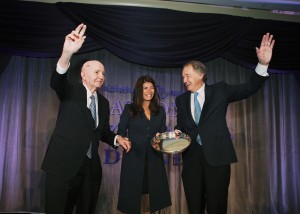Dr. Francis Collins (above), Director of the National Institutes of Health (NIH), cited Alzheimer’s as the costliest disease in America at the Alzheimer’s Association National Dinner Tuesday night at DC’s downtown Renaissance Hotel. Collins received an award — the Ronald and Nancy Reagan Research Award, reserved for those who make significant advancements in Alzheimer research — for his work, support, and for dedicating $40 million from his 2013 director’s budget for Alzheimer’s research.

Projected to cost the nation $214 billion in 2014, with projections to reach $1.2 trillion by 2050, nearly one in five dollars spent by Medicare is on someone with Alzheimer’s or another dementia. So that $40 million couldn’t have come at a better time.
Neither could the help of Senator Jim Moran (ranking member of the Senate Appropriations Subcommittee on Labor, Health and Human Services, Education, and Related Agencies) who led the charge to secure the largest increase in Alzheimer’s funding to date — an additional $122 million in the fiscal year 2014 budget for Alzheimer’s research, education, outreach and caregiver support, resources. Or the Judy Fund, established by Marshall Gelfand and his family in memory of his wife, Judy Gelfand, which has raised more then $5 million in support of the nonprofit’s research, care and advocacy efforts. Both received recognitions at the annual event.
Co-chaired by Evan Thompson (AIM Chairman) and Bob Thomas (AIM Treasurer), the 26th advocacy forum and gala event brought together some 800+ advocates from all 50 states to address Alzheimer’s as a rapidly growing health crisis and to rally around and inspire others to join the growing movement.
According to the Alzheimer’s Association’s 2014 facts and figures, more than 5 million Americans are currently living with the disease, and that number is poised to grow to as many as 16 million by 2050.
*Images courtesy of the Alzheimer’s Association, ALZ.org





